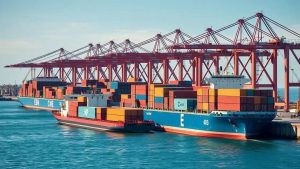US-China trade war escalation: what it means for the economy

Anúncios
The US-China trade war involves escalating tariffs and trade barriers, significantly impacting global trade dynamics, businesses, and economic strategies worldwide.
The US-China trade war escalation is raising eyebrows globally, as its implications ripple through economies and industries. Ever wondered how this could affect your business strategy? Keep reading to find out.
Anúncios
Overview of the US-China trade war
The US-China trade war has been a significant global event, shaping economic discussions worldwide. Understanding its origins and implications can provide insight into the broader economic landscape.
What is the US-China trade war?
At its core, the US-China trade war refers to the escalating series of tariffs and trade barriers between the two largest economies. Initially, concerns over trade imbalances led to the conflict, but it has since evolved into discussions about technology, intellectual property, and economic strategies. Countries around the globe have watched closely, recognizing the potential impacts.
Anúncios
Key Elements of the Trade War
- Tariffs: Tariffs have been imposed on a variety of goods ranging from electronics to agricultural products.
- Negotiations: Both nations have engaged in talks to address trade concerns and reach an agreement.
- Global Effects: The trade war has implications for businesses and consumers worldwide, affecting prices and availability of products.
The impact extends beyond just tariffs. It influences global supply chains as companies reassess their operations. Businesses that relied heavily on either economy have to adapt swiftly to the changing landscape.
As the trade war continues, observers note shifts in alliances and economic strategies from other countries. Certain nations may see opportunities to strengthen their own positions in the global market amid the tensions.
Understanding the US-China trade war is crucial for anyone interested in global economics or business. The ongoing nature of this conflict means it will likely have lasting effects, reshaping international relations and economic strategies for years to come.
Key events leading to escalation

Understanding the key events leading to escalation in the US-China trade war provides valuable context for the ongoing conflict. These events have shaped international relations and economic strategies around the globe.
Initial Tariffs Imposed
The trade war began when the United States imposed tariffs on various Chinese goods in early 2018. This move was aimed at addressing the growing trade deficit and concerns over unfair trade practices.
Retaliation from China
In response, China implemented its own tariffs on US products. This back-and-forth escalation led to increased tensions between both countries, affecting not just businesses but also consumers. The sudden rise in prices due to tariffs created uncertainty in the market.
- Effects on Agriculture: US farmers faced losses as China is a major export destination for agricultural products.
- Technology Sector Impact: Companies in the tech industry began to feel the effects as tariffs targeted electronics.
- Currency Manipulation Accusations: There were allegations from the US that China was manipulating its currency to gain a competitive advantage.
The situation escalated further with the introduction of new tariffs and trade barriers, marking significant turning points in the conflict. As negotiations continued, each setback led to heightened tensions and economic consequences for both nations.
Over time, not only the agriculture and technology sectors faced challenges, but also manufacturing industries began adjusting to new realities. Companies sought alternative supply chains as uncertainty grew. This shift illustrates how deeply the US-China trade war has impacted global markets.
As events unfolded, both nations began to realize the complexity of the trade issues at hand. Negotiations aimed at resolving these concerns saw various ups and downs, reflecting the complicated intertwining of economic interests.
Economic implications for both countries
The economic implications of the US-China trade war are significant for both countries, affecting industries, jobs, and market stability. This ongoing conflict has manifested in various ways, impacting growth projections and consumer behavior.
Impact on GDP
One of the most immediate effects has been on the Gross Domestic Product (GDP) of both nations. The trade war has caused uncertainty, leading to slower economic growth rates. In the US, businesses have reported declining sales due to tariffs increasing product prices.
Job Market Fluctuations
As companies adjust to fluctuating costs and market demands, job markets in both countries are feeling the strain. Many American farmers have faced challenges, while industries reliant on exports to China have had to rethink their strategies.
- Manufacturing Jobs: US manufacturing has encountered setbacks, causing job losses in various sectors.
- Agricultural Exports: Chinese tariffs on US agriculture products have hurt many American farmers financially.
- Technology Sector Vulnerabilities: Companies in the tech sector have also experienced shifts in trade relationships.
The intensity of the trade conflict has led businesses to reconsider their supply chains. Companies are searching for alternative partners and markets to mitigate risks associated with trade fluctuations.
China’s economic landscape is also transforming. As the country reacts to tariffs, it seeks to stimulate its economy through domestic consumption and investment. This shift signals a potential long-term change in its economic strategy.
Ultimately, the economic implications of the trade war extend beyond immediate costs. Both nations must navigate a complex web of political, economic, and social factors that will shape their futures.
Effects on global trade dynamics

The effects on global trade dynamics due to the US-China trade war are profound and far-reaching. This conflict has reshaped how countries interact economically, influencing trade patterns across the globe.
Shift in Trade Routes
As tariffs have disrupted traditional trade relationships, countries have started looking for new partners. For example, nations in Southeast Asia have become more appealing alternatives for businesses seeking to avoid tariffs on Chinese products. This shift in trade routes is prompting changes in global supply chains.
Changing Trade Policies
Countries are also reevaluating their trade policies in light of these developments. Many are seeking to establish more favorable trade agreements to enhance their global competitiveness.
- Emerging Markets: Countries like Vietnam and India are gaining attention as potential alternatives for manufacturing and exports.
- Free Trade Agreements: Nations are forming new partnerships to mitigate the impacts of US-China tensions.
- Investment Shifts: Companies are reconsidering where to invest based on potential risks associated with the trade war.
The uncertainty stemming from the US-China trade war has pushed countries to adapt quickly. As a result, international businesses are being forced to navigate a more complex and fragmented global landscape. Some firms are rethinking their strategies, moving towards diversification to hedge against risks.
The implications do not only affect trade balances but also influence diplomatic relationships among various countries. Nations find themselves in a delicate position, taking sides or remaining neutral as they assess their own economic interests.
Overall, the trade war has catalyzed significant shifts in global trade dynamics, compelling countries and businesses to adapt proactively.
Future predictions and expert opinions
Future predictions and expert opinions regarding the US-China trade war provide insight into what might lie ahead. Experts are analyzing trends and proposing potential outcomes based on the ongoing conflict.
Scenarios for Resolution
Many economists believe the trade war could lead to either a resolution or a prolonged tension. If negotiations succeed, we could see a return to more favorable trade conditions. However, if conflicts continue, various sectors might face increased volatility.
Impact on Global Economy
Experts suggest that a prolonged trade war may have dire consequences for the global economy. Companies may be forced to adjust their supply chains, leading to higher prices for consumers around the world. In particular, the technology and agriculture sectors might face significant challenges.
- Market Volatility: Increased tensions could lead to stock market fluctuations as investors react to new tariffs.
- Shifts in Alliances: Countries may seek to strengthen ties with either the US or China, impacting global trade relations.
- Changes in Consumer Behavior: Consumers may turn to alternative products and brands in response to higher prices.
As the situation evolves, experts emphasize the importance of adaptability for businesses. Companies that successfully navigate these changes could position themselves favorably in the market. Conversely, those that fail to react might struggle to survive.
In conclusion, the future of the US-China trade war is uncertain, but expert analysis provides valuable context for understanding potential consequences.
How businesses can adapt to changes

In the face of the US-China trade war, businesses must adapt quickly to the changes in the economic landscape. Strategic adjustments are crucial for survival and growth in this evolving environment.
Reassessing Supply Chains
One of the immediate steps businesses can take is to reassess their supply chains. Companies that heavily rely on Chinese imports need to explore alternative suppliers. This shift can reduce vulnerability to tariffs and trade barriers.
Diversifying Markets
Another effective strategy is to diversify markets. Expanding into new regions can minimize risks associated with trade reliance on a single country. Exploring opportunities in Southeast Asia, Europe, or Latin America can help businesses stabilize their revenues.
- Finding New Partnerships: Establishing relationships with suppliers in different countries can provide more options and flexibility.
- Localizing Production: Some businesses may benefit from relocating production closer to their main markets.
- Investing in Technology: Automation and advanced technology can streamline processes, making companies more competitive.
Additionally, it’s essential for businesses to stay informed about trade policies. Keeping up with changes allows them to make timely adjustments and avoid disruptions. Engaging with trade organizations can facilitate access to relevant information and resources.
Companies should also consider enhancing their customer engagement strategies. By understanding changing consumer preferences, businesses can adapt their offerings to meet new demands arising from the trade war’s impact.
In summary, adapting to changes brought by the US-China trade war requires proactive strategies. By reassessing supply chains, diversifying markets, and investing in technology, businesses can navigate this challenging landscape successfully.
FAQ – Frequently Asked Questions about the US-China Trade War
What are the main causes of the US-China trade war?
The trade war is primarily caused by concerns over trade imbalances, tariffs, and allegations of unfair trade practices.
How does the trade war affect businesses?
Businesses face increased costs due to tariffs, which can lead to higher prices for consumers and necessitate strategic adjustments.
What strategies can companies use to adapt to the trade war?
Companies can reassess supply chains, diversify their markets, and invest in technology to remain competitive during these changes.
What is the future outlook for the US-China trade war?
The future remains uncertain, but experts suggest that adaptability will be key to navigating the challenges and potential outcomes of the ongoing conflict.






